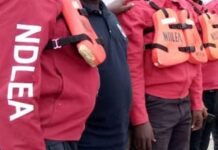
By Tosin Kolade
The Nigeria Centre for Disease Control (NCDC), on Wednesday, expressed concern over
cholera cases in states, with Cross River and Taraba leading.
Ms Jessica Akinrogbe, the Senior Emergency Response Officer, NCDC, made the centre’s position known at the monthly
meeting of WASH in Emergency Working Group in Abuja.
She said a total of 1,359 confirmed cases were reported from January 2022 till date.
She added that no fewer than 31 deaths were recorded in 15 states, including Cross River, Taraba, Borno, Bayelsa, Adamawa, Kebbi, Rivers, Ondo and Lagos.
She said “out of these states, Cross River and Taraba had the highest cases of 558 and 282 respectively.’’
Akinrogbe said that the centre had deployed rapid response teams to the states to curtail the spread, adding that with the approaching rainy season, efforts must be geared toward preventing recurrence.
She called on the states to step up their cholera preparedness and response plan and build capacities to manage emergencies.
Mr Olu-Daniels Ibiyemi, the Deputy Director, WASH Response and Collaboration, Federal Ministry of Water Resources, said the Federal Government had started intervention activities in Kano and Katsina states.
He said the two states were also part of the cholera hotspot sites, saying the ministry would continue to support states through advocacy and coordination and urged the states to take responsibility on preparedness and response plan.
Ibiyemi said “it is not the duty of the Federal Government to provide water and sanitation facilities to states, but to give support through advocacy.’’
The deputy director added that efforts were on to follow up states to finalise their cholera preparedness and response plan, saying this would help in mitigation efforts.
The UNICEF Chief of WASH, Ms Jane Bevan, said states required clear coordination and response plans to manage emergency situations, “so that
when emergencies happen, they can quickly see who needed to be contacted, what responses to be given in terms of clean water.
“This also include actions to be taken to sensitise people on safe water use and hygiene behaviours to minimise spread of the outbreak’’.
Bevan added that it was impressive to see that the Federal Government had taken responsibility of coordination with the establishment of WASH in emergency working group.
Mr Rangaiya Kanaganathan, the Head of Department, WASH, Action Against Hunger, said the organisation had strengthened coordination with the National Cholera Technical Working Group.
He said such coordination ensured the training of volunteers, health workers on cholera response in focal states of Borno, Yobe, Bauchi, Jigawa, Kano and Sokoto states.
He added that “18 cholera kits were distributed to hotspot local government areas, while 5,813 households received water treatment chemicals.
“A total of 107 persons (60 males and 47 females) were trained on hygiene and sanitation promotion, water quality monitoring, water schemes operation and maintenance, while 40 water points were chlorinated.’’ (NAN)



